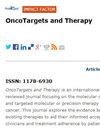Exosome-Delivered EGFR Induced by Acidic Bile Salts Regulates Macrophage M2 Polarization to Promote Esophageal Adenocarcinoma Cell Proliferation
IF 2.7
4区 医学
Q3 BIOTECHNOLOGY & APPLIED MICROBIOLOGY
引用次数: 0
Abstract
Purpose: Chronic gastroesophageal reflux disease (GERD) causes the abnormal reflux of acid and bile salts, which would induce Barrett’s esophagus (BE) and esophageal adenocarcinoma (EAC). EGFR, as one of main components of the exosome, plays an important role in cancer progression. Here, we investigated the role of acidic bile salts (ABS)-induced exosomal EGFR in EAC cell proliferation.Methods: Electronic microscopic examination and Western blot were used to identify exosomes. Western blot, siRNA transfection, enzyme-linked immunosorbent assay, qRT-PCR, cell viability detection, mouse xenograft tumor models, and immunohistochemical staining were performed to study the function of ABS-induced exosomal EGFR in cell proliferation.
Results: We found that ABS improved the exosomal EGFR level of normal human esophageal epithelial cells, BE cells, and BE-associated adenocarcinoma cells. The results were confirmed in the serum-derived exosomes from healthy persons and patients suffering from GERD, BE with or without GERD, and EAC with or without GERD. Moreover, cell line-derived exosomal EGFR was found to promote macrophage M2 polarization through the PI3K-AKT pathway. The co-incubation medium of macrophages and exosomes improved cell proliferation and tumor growth, which depended on the exosomal EGFR level. CCL18 was identified as the most effective component of the co-incubation medium to promote EAC cell proliferation by binding to its receptor PITPNM3 in vitro and in vivo.
Conclusion: Our findings demonstrate that ABS-induced exosomal EGFR regulates macrophage M2 polarization to promote EAC proliferation. This study provides an important insight into the role of ABS in EAC development.
Keywords: cancer progression, pro-oncogenic, PI3K/AKT pathway, CCL18, PITPNM3
酸性胆盐诱导的外泌体递送表皮生长因子受体调控巨噬细胞M2极化,促进食管腺癌细胞增殖
目的:慢性胃食管反流病(GERD)会导致胃酸和胆盐异常反流,从而诱发巴雷特食管(BE)和食管腺癌(EAC)。表皮生长因子受体(EGFR)作为外泌体的主要成分之一,在癌症进展中发挥着重要作用。在此,我们研究了酸性胆盐(ABS)诱导的外泌体表皮生长因子受体在EAC细胞增殖中的作用:方法:采用电子显微镜检查和 Western 印迹法鉴定外泌体。结果:我们发现ABS提高了外泌体EGFR在EAC细胞增殖中的作用:结果:我们发现ABS能提高正常人食管上皮细胞、BE细胞和BE相关腺癌细胞的外泌体表皮生长因子受体水平。这一结果在健康人和胃食管反流病患者、伴有或不伴有胃食管反流的BE以及伴有或不伴有胃食管反流的EAC的血清外泌体中得到了证实。此外,研究还发现细胞系衍生的外泌体表皮生长因子受体能通过PI3K-AKT途径促进巨噬细胞M2极化。巨噬细胞和外泌体共孵育培养基可改善细胞增殖和肿瘤生长,而这取决于外泌体表皮生长因子受体的水平。CCL18通过与其受体PITPNM3结合,在体外和体内被确定为共孵育培养基中促进EAC细胞增殖的最有效成分:我们的研究结果表明,ABS诱导的外泌体表皮生长因子受体可调节巨噬细胞M2极化,从而促进EAC细胞增殖。关键词:癌症进展 促癌 PI3K/AKT 通路 CCL18 PITPNM3
本文章由计算机程序翻译,如有差异,请以英文原文为准。
求助全文
约1分钟内获得全文
求助全文
来源期刊

OncoTargets and therapy
BIOTECHNOLOGY & APPLIED MICROBIOLOGY-ONCOLOGY
CiteScore
9.70
自引率
0.00%
发文量
221
审稿时长
1 months
期刊介绍:
OncoTargets and Therapy is an international, peer-reviewed journal focusing on molecular aspects of cancer research, that is, the molecular diagnosis of and targeted molecular or precision therapy for all types of cancer.
The journal is characterized by the rapid reporting of high-quality original research, basic science, reviews and evaluations, expert opinion and commentary that shed novel insight on a cancer or cancer subtype.
Specific topics covered by the journal include:
-Novel therapeutic targets and innovative agents
-Novel therapeutic regimens for improved benefit and/or decreased side effects
-Early stage clinical trials
Further considerations when submitting to OncoTargets and Therapy:
-Studies containing in vivo animal model data will be considered favorably.
-Tissue microarray analyses will not be considered except in cases where they are supported by comprehensive biological studies involving multiple cell lines.
-Biomarker association studies will be considered only when validated by comprehensive in vitro data and analysis of human tissue samples.
-Studies utilizing publicly available data (e.g. GWAS/TCGA/GEO etc.) should add to the body of knowledge about a specific disease or relevant phenotype and must be validated using the authors’ own data through replication in an independent sample set and functional follow-up.
-Bioinformatics studies must be validated using the authors’ own data through replication in an independent sample set and functional follow-up.
-Single nucleotide polymorphism (SNP) studies will not be considered.
 求助内容:
求助内容: 应助结果提醒方式:
应助结果提醒方式:


